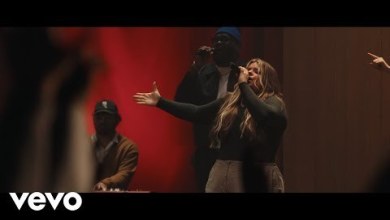In the Spotlight|May 22, 2014 07:33 EDT
Carman Offers Insight Into Cancer Battle, Making the Most of Second Chances, and How Other Than Jesus He Has No 'Plan B' (INTERVIEW)
Christian music pioneer and evangelist Carman Licciardello chatted with BreatheCast about his battle with cancer, getting a second chance, new album No Plan B, and rapping with TobyMac in the early 90s.
BreatheCast: First and foremost so thrilled for your healing of Cancer. How did this whole trial change your life and what has it taught you about life and God?
Carman: I think the biggest thing is that you get a second chance, you want to make sure that you are making good use of the time that you're given a second chance for. You just want to make the biggest difference as you possibly can, and not waste time.
BC: One day when your time does come, what type of legacy would you want left on Earth, and what do you want to hear from God when you walk through the gates?
Carman: Well classically, you'd want to hear what the scripture says, "Well done thou good and faithful servant" that's what everybody's going to say, but I think most important is finding God's will for your life and doing it whatever that is. That's the most important thing, whatever that may be. Whatever amount of people is involved in effecting, that's really up to the Lord. I just want to have found God's will and to have done it.
BC: Tell us about No Plan B and the upcoming tour. Why was it so long between albums, and what can we all expect from the album?
Carman: Well I think what happens just like everything else in music, tastes change, and musical direction change, record companies change, new artists come on and more focus is put on newer artists than older artists. You know when you've been on the road for as long as I have...I was doing tours from 83 to 2002, so that's a long haul. You want to do something else, and rest up and try some different things especially when you've done it for so long, it's kind of easy for the whole industry to keep rolling along progressively and unless you keep putting out product it's hard to keep up with. Every artist goes through it, you go through a dead time where it's just like, 'I have no more songs, I'm done,' and then something happens, and it rekindles it. That's kind of what happened here.
BC: Aside from the name, was this album sparked before the cancer, during the cancer, after it, or did it all just come together over a period of time?
Carman: I wrote all the songs after I was diagnosed, so I'm sure that everything I've written has been affected by things I've been through. The whole idea of No Plan B is in my life it's not like I never wanted to do something else other than serve the Lord, so there was no other plan. That's why No Plan B felt like the appropriate title.
BC: You've always been a story-teller in your music. Where do you draw inspiration for these stories and how do you feel crafting and setting a story for your music makes it more powerful?
Carman: I don't know if you can really plan that. I think it is kind of the way you might individually interpret it. You know people will just see things differently. Some people are directors, some people are writers, some people are actors, some people need words on the paper, some people write the words on the paper. So I think that sort of just wraps up in your individual talent. Where that comes from, man I don't know.
BC: Why do you think music is such a powerful tool to reach the lost, and even encourage the saved who are having a tough time?
Carman: Well, I think it's easy to understand music. Everybody loves music, everybody has musical tastes, and music is emotional and takes truth and puts it on the heals of emotion. It goes right inside, you don't have to convince yourself of anything, you just start singing along whether you like what you're singing or not.
BC: Lately being a Christian artist has gotten a bad wrap. Why do you think Christian artists are now shying away from the label, and what do you think they could do to reverse that stigma?
Carman: It's hard to address that unless you deal with it on an individual case by case basis. Sometimes, some guys just write the songs as life as they see it. They are interpreters of life around them, and they put those interpretations of life into a song. Sometimes people want to categorize them as a Christian artist. They may be Christians, and they may be artists, but when you put someone in a category of a Christian artist, usually what that means to everybody else is that you are singing praise songs and worship songs. Sometimes guys just don't write about those things all the time. I think sometimes it makes some artists get stuck, and then the record company doesn't want to promote them because they already labeled them before they even started. I think it's more that than they are trying to run from their Christianity.
BC: In the 90s you messed around with hip-hop a lot. Do you have any of that left in the tank?
Carman: I think when hip-hop and rap was younger and not as developed, we all had a better chance of participating. But as it's gotten more developed and more its own category, when you are just toying around with it, it really shows up as insincere and it is really not your field. I think you just sort of really develop your own style. I've always done syncopated lyrics cut to music, I don't know if you can call that rap or not, but it's talking in time with the music. There are elements of rap in it, there are components in it, but it doesn't fall in the category of rap.
BC: You did get to rap with TobyMac in 1993 for the song "Addicted to Jesus."
Carman: Yeah and that was actually one of the more authentic rap things that we did. Even Toby has changed his style, and adjusted to something that is more custom fit to him where it doesn't fall in any other category. He's got his own thing, even he knew that. You're not going to be Jay Z, you're not going to be Tupac, you're not going to be these other guys, you're just going to be yourself. Somewhere along the way he decided this is what I do, this is what I do best, and lets just put it out there and people loved it because it was him. It was unique to him, and if anybody else tried to duplicate it, they would be trying to sound like him. So that's how you develop your own style.
BC: As far as today's Christian music, who do you keep on your radar, and what do you think of some of the newer artists?
Carman: I don't really listen to a lot of Christian music. A lot of it to me doesn't really have a strong message to it. Musically if I want to get ideas and listen to new and innovative sounds, I'll be listening to secular music for the skill set. So Christian music has always been a step behind. We have this category called CCM music, then we have this other category called praise and worship. We never used to have categories, everything was praise and worship. CCM is like music without the praise and worship, but it doesn't have the impact that it used to. There are some individuals that have a very strong impact musically, but I think a good many of the artists out there, they are pressured from their record companies to get crossover hits. It makes them want to take stuff out of their songs to appeal to a broader audience and by taking stuff out you take out the effectiveness of it.
BC: A lot of people say that there is always a copy of a secular band in Christian music. For instance, if there is a band like Linkin Park, all of a sudden there is a Christian band that does rap and rock in a similar fashion.
Carman: Well it's always going to be that way as long as we are 5% of the music sales overall, we are always going to be following the trends and what's cool, and we aren't establishing those trends. It's always been that way.
BC: What do you think of Hollywood's sudden interest in putting the Bible on the big screen?
Carman: I think it's great. It's just another artform. Some are hitting it really well, and are getting great reviews, and others are just spectacles like the whole "Noah" thing, but I didn't see it, but I heard about it. I think everyone is trying to put their hand in the race because they see an audience with that. The only thing that could make it confusing is if you put out something like a "Noah," and there's so many things in there that it gives a false story.
BC: Getting back to the music, as far as your health and getting ready for this tour, how are you preparing?
Carman: You do everything you can do. You get out there and start working out, and start running again to get your cardio up and your wind up. Just rehearsing the songs like any other tour except you haven't done it for awhile. I'm sure it will be fine.
Carman has 25 albums in various formats and musical since 1980. He has seven Dove Awards, four Grammy nominations, and has starred in several movies. No Plan B will be released on May 27 which will be followed by the Live Across America Tour.












